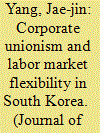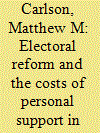| Srl | Item |
| 1 |
ID:
071587


|
|
|
|
|
| Publication |
2006.
|
| Summary/Abstract |
There is significant variance in the strategies of labor market flexibility under the same pressure of globalization. This article attempts to explain that variance by examining closely the Korean case, with particular attention given to the response of labor, one of the most intractable actors in the reform process. After theorizing the nature of social welfare as a quasi-collective good and hypothesizing labor's responses based on Olson's theory of collective action, the article seeks to explain Korea's low commitment to flexicurity and the resultant dualism in the labor market. The core argument here is that the collective action problem among atomized corporate unions has led to high employment protection for regular workers in big business at the expense of marginal workers without appropriate social protection.
|
|
|
|
|
|
|
|
|
|
|
|
|
|
|
|
| 2 |
ID:
071588


|
|
|
|
|
| Publication |
2006.
|
| Summary/Abstract |
How does the choice of electoral rules affect politicians' incentives to campaign on the basis of personalized support? This article examines to what extent the adoption of new electoral and campaign finance rules affects the incentives of politicians in Japan's Liberal Democratic Party to rely on personal support organizations called koenkai. The core of the analysis utilizes newly collected campaign finance data. The empirical analyses confirm a considerable weakening in the number of koenkai across systems as well as a decreased need for politicians to spend money in the new proportional koenkai representation tier. These results highlight the importance of previous organizational legacies as well as the efforts of political actors to mitigate the effects of rule change on their election and reelection prospects.
|
|
|
|
|
|
|
|
|
|
|
|
|
|
|
|
| 3 |
ID:
071586


|
|
|
|
|
| Publication |
2006.
|
| Summary/Abstract |
Ample empirical evidence suggests that Rural Credit Cooperatives (RCCs), which are the core financial institutions in rural China, are not accountable to their member households. This article argues that this conundrum can be explained by an institutional analysis of the credit cooperatives using the multiple principals-agent framework: the credit cooperatives as agents are accountable to multiple heterogeneous principals¾with multiple conflicting objectives. The multiple principals are (1) the County RCC Unions, which exercise control using the evaluation criteria on which the remuneration of grassroots RCC officers is assessed; (2) local party secretaries, who exert influence through top personnel appointment and dismissal in the credit cooperatives; and (3) member households, which are a "collective" principle. In a multiple-principals scenario, the "collective" principal has weaker control over the agents due to the "collective action" problem.
|
|
|
|
|
|
|
|
|
|
|
|
|
|
|
|
| 4 |
ID:
071589


|
|
|
|
|
| Publication |
2006.
|
| Summary/Abstract |
Facing massive protests, why did incumbent regimes in both South Korea and Poland repress movements for democratization in the early 1980s but make democratic concessions to the opposition in the late 1980s? This article demonstrates how the United States and the Soviet Union as superpower patron states influenced democratic transitions in South Korea and Poland. The different outcomes across time are partially attributed to superpower policies toward their client states. Absent in 1980 were strong, credible signals from the United States and the Soviet Union to their respective client states to support political liberalization. But in the late 1980a, superpowers affected the calculus of client state elites by either signaling or encouraging governments to make concessions to the opposition.
|
|
|
|
|
|
|
|
|
|
|
|
|
|
|
|